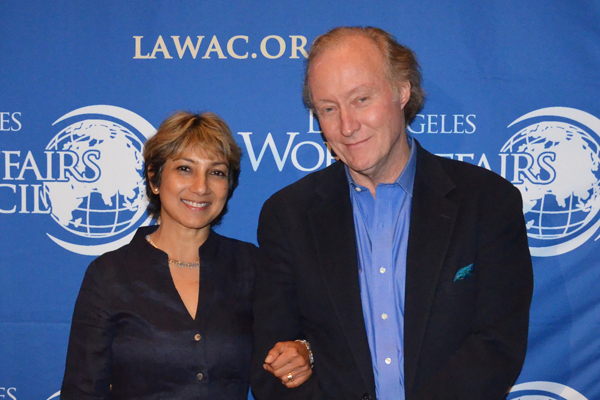 Ani Zonneveld and Terence Ward.
Ani Zonneveld and Terence Ward.
Key Takeaways:
Terence Ward:
"Under Wahhabism, history is not important, hence the destruction of Palmyra. Within this construct is a very young, intolerant and brash interpretation of Islam. If it stayed within Saudi Arabia it wouldn’t be a huge problem, but the problem is they want to spread it."
"Do you think that America has sustained or encouraged Saudi Arabia or do you think we’ve idly sat by. Anyone in the Middle East will say America has had a strong role to play in giving the green light of deflection for what is happening the Muslim world. They know it couldn’t have happened without the blessing of silence, money, and oil."
"Mohamed bin Salman has a lot of American advisers who are trying to help him change the economy and government. I don’t think nuclear technology should be part of that. If there’s anything Obama did it was removing nuclear from the agenda by making the nuclear deal."
Ani Zonneveld:
"When this particular interpretation of Islam [Wahhabism] is infused and exported wherever there are Muslims, it has co-opted the true spirit of Islam, which is inclusive. So now we have a conflict in the Muslim world of one that is inclusive and one that is intolerant and exclusive. Not just on religious terms but political terms."
"The most powerful element of what the Saudi Arabia-based Organization of Islamic Cooperation does is what they do with quotas. There’s a percentage of how many Muslims in each country get visas to go to Mecca on pilgrimage. If your country is disputing something with Saudi Arabia your quota goes down. That’s how religion is being played in the political realm."
Zonneveld was the subject of a recent film al imam by the USC School of Cinematic Arts and selected by National Geographic for their Short Film Showcase. Al imam is a personal view of Zonneveld's work and beliefs as one of the few female imams in the world. You can watch it here.
Video from the Markaz can be viewed here.
